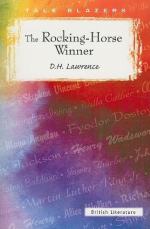|
This section contains 1,826 words (approx. 7 pages at 300 words per page) |

|
SOURCE: "The Autoerotic Metaphor in Joyce, Sterne, Lawrence, Stevens, and Whitman," in Literature and Psychology, Vol. 15, No. 2, 1965, pp. 92-106.
In the following essay, Isaacs finds Paul's riding of the rocking-horse to be an allusion to sex and masturbation; the critic also theorizes that Paul dies because he cannot bear the guilt he feels after his mother finds him on the rocking-horse.
[D. H. Lawrence's "The Rocking-Horse Winner"] has an uncannily powerful emotional effect which is produced in a manner quite unlike the tedious labored repetitions, straightforward moralizings, and elaborately pantomimed dumb-shows which characterize Lawrence's typical effects. But I had never been able satisfactorily to explain the way the story works to produce its effect, until the basic autoerotic metaphor in it was pointed out to me.
"The Rocking-Horse Winner" seems to be a curious combination of the worldly and the supernatural. There is on the one hand the...
|
This section contains 1,826 words (approx. 7 pages at 300 words per page) |

|


